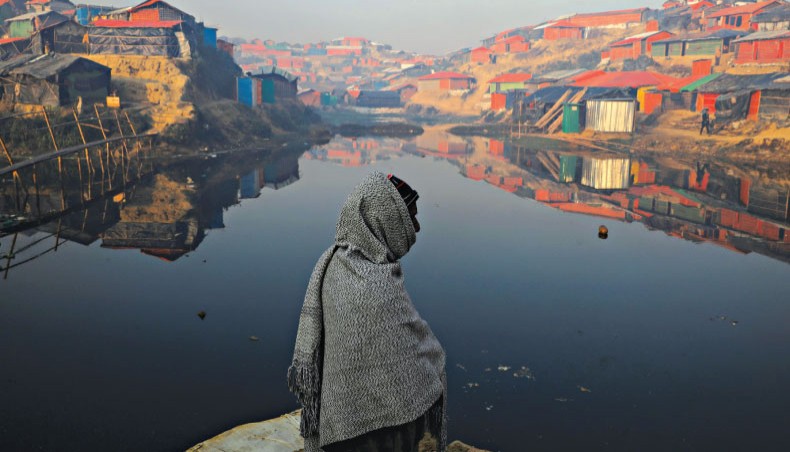ROHINGYA REPATRIATION Govt prepares to submit list
The government is preparing to submit a list of forcibly displaced Myanmar nationals to start their repatriation to the country.
A process is underway to sign a specific bilateral instrument in ‘a speedy manner’ on a physical arrangement with developing a mechanism for verification of Rohingyas who crossed over to Bangladesh from Myanmar, logistics arrangements and communications between both sides.
National Taskforce on Implementation of Strategy on Myanmar Refugees and Undocumented Myanmar Nationals, headed by foreign secretary M Shahidul Haque, is scheduled to meet on Thursday in Dhaka.
They will assess the need and preparations on repatriation of Rohingyas before the first meeting of the joint working group of the two countries, officials said.
‘We are trying to hand over a list of about 1,00,000 Rohingyas to Myanmar,’ a senior diplomat with knowledge of the matter told New Age.
Many serving and retired diplomats were, however, cautious in expressing their hope about implementation of terms-of-reference of the JWG as they believe that loopholes in the ‘arrangement’ signed between the two sides on November 23 may impede implementation of the TOR.
‘It is difficult to make laws and rules effective under a weak constitution,’ said a senior government official, who was a member of Bangladesh delegation, led by foreign minister AH Mahmood Ali.
The minister signed the ‘Arrangement on Return of Displaced Persons from Rakhine State’ on November 23 in Myanmar.
Ali played a key role in signing the instrument in spite of serious reservations from diplomats and most of the bureaucrats of the Bangladesh delegation on several clauses of the document.
Ali agreed to incorporate a Myanmar proposal, in the instrument, to involve Bangladesh courts to certify ‘the members of split families’, ‘their left-behind members’, ‘orphans’ and children born out of unwarranted incidents.
A senior government official representing the prime minister’s office pointed out that it would be an ‘extra-ordinary jurisdiction’ for Bangladesh courts going beyond the national constitution and legal procedures as the places of occurrences were in a sovereign foreign land.
It would be a difficult and long process to get each of the thousands of cases certified as ‘there are grey areas’ as regards involvement of the court, an official said, adding that flexibility was extended much more from Bangladesh side.
Both the ‘arrangement’ and the JWG-TOR have made mandatory for Bangladesh to involve the UNHCR and other mandated UN agencies and interested international partners in various stages of repatriation, while the same matter was kept diluted in the ‘arrangement’ allowing these organisations to take part on ‘invitation’ in ‘appropriate’ time and situation, officials said.
Foreign minister Ali carried a draft provided by the Myanmar side seeking Bangladesh to forgo rights to raise the Rohingya matters at bilateral levels with any country and at international platforms after the signing of the instrument on November 23, although in the senior official-level meeting in the morning on the day Bangladesh clearly declined to accept the Myanmar proposal.
There was heated debate between Ali and other members of the Bangladesh delegation about keeping such provisions in the instrument with a foreign country, said a senior official, who was a member of the delegation.
The representative of the Bangladesh prime minister’s office left the meeting room in protest, said officials.
The proposal seeking Bangladesh’s disengagement at international level on Rohingya issues was, however, dropped under pressure from Bangladesh officials, meeting sources said.
The foreign ministry issued a press release on November 23 night reading, ‘On the morning of 22 November 2017 in Nay Pyi Taw, the senior officials of both countries negotiated the draft at their level. Later in afternoon, foreign minister Mahmood Ali and the union minister U Kyaw Tint Swe “resolved the remaining issues and finalized the draft after discussion”.
Asked what he ‘resolved’ with the Myanmar minister, Ali replied to a New Age question at a press conference in Dhaka on November 25, saying that the matters of negations should not be made public after reaching an agreement.
Rohingyas have continued to cross over the border to Bangladesh in small groups till Tuesday, officials said, although, Myanmar has agreed, in the ‘Arrangement’ to take necessary measures to halt the outflow of Myanmar residents to Bangladesh.
The Bangladesh authorities are preparing lists of Rohingyas based on the registrations made on their crossing of the border, while a section of government officials believe that registrations in Bangladesh may act like a ‘double-edge sword’ creating more difficulty in the verification process.
Preserving ‘ethnicity’ and the points of ‘ethnic cleansing’ and ‘genocide’ are matters of international consideration as the Myanmar authorities were clearly unwilling to accept the matters for considerations.
Bangladesh Enterprise Institute vice president Humayun Kabir told New Age on Tuesday that implementation of both the ‘arrangement’ and JWG-TOR fully depend on political goodwill of the Myanmar authorities.
‘Things done so far were purely theoretical,’ he said, adding, ‘there should be visible manifestation of political goodwill to take Rohingyas back home’.
The two sides also agreed to consider the repatriation of Myanmar residents who crossed over to Bangladesh before October, 2016, on the conclusion of the return of Rohingyas who fled violence in Rakhine State after October last year.
Over 6,55,000 Rohingyas, mostly women, children and aged people, entered Bangladesh fleeing unbridled murder, arson and rape during ‘security operations’ by Myanmar military in Rakhine, what the United Nations denounced as ethnic cleansing, between August 25 and December 26. Several international authorities denounced the operations as genocide.
The ongoing Rohingya influx took the total number of undocumented Myanmar nationals and registered refugees in Bangladesh to over 10,74,000 till December 15, according to estimates by UN agencies.
News Courtesy: www.newagebd.net











